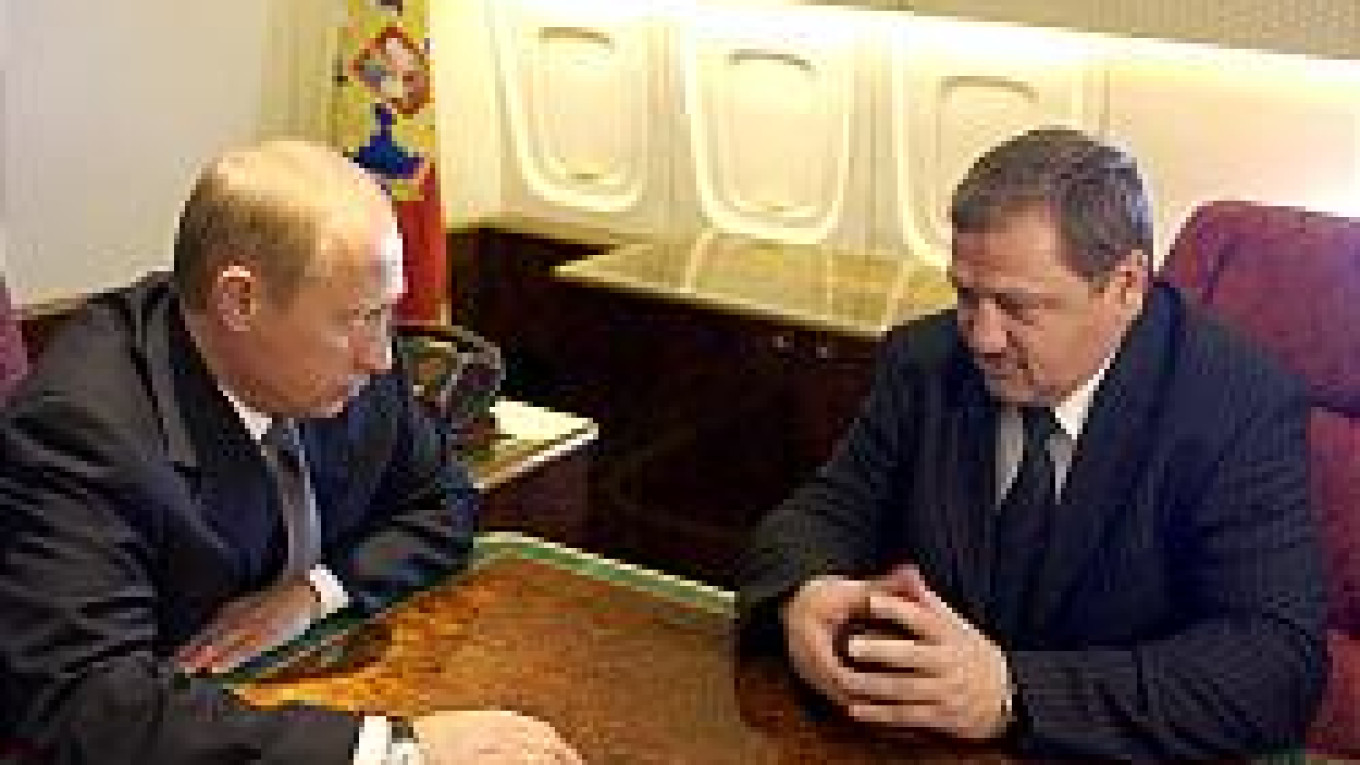Washington was dismayed to learn that Putin had brought along Akhmad Kadyrov, the Kremlin's handpicked candidate for the Chechen presidency, whose forces are accused of human rights abuses and election violence, two U.S. officials confirmed late last week.
The disclosure came as influential lawmakers and human rights advocates pressured Bush to bring up violations in Chechnya with Putin, in public and in private. American officials also are more bluntly arguing that Russian behavior in Chechnya is radicalizing the predominantly Muslim population and creating a security threat for both the United States and Russia.
But the diplomatic discomfort over Putin's entourage shows how Chechnya, long a back-burner irritant in U.S.-Russian ties, has the potential to flare into a more serious problem despite desires to keep the warming relationship on track.
Kadyrov, whom Putin appointed in June 2000 as interim leader of Chechnya, is one of seven candidates left in the highly controversial Chechen presidential election slated for Oct. 5. His strongest challengers have been pushed out.
Kadyrov's security force has swelled in recent months from 1,500 to 3,000 armed men, according to the Moscow Helsinki Group, a human rights organization. His security force also is believed to be the main supplier of vodka to Russian military forces.
Russian human rights groups report that gunmen have attacked and intimidated Kadyrov's opponents and their supporters and families. On Sept. 9, gunmen driving cars bearing Kadyrov's portrait shot and killed the son of a top campaign official for an opposition candidate, then shot their way into the official's home, according to the Moscow Helsinki Group.
"I don't want to call it an election," said Sarah Mendelson, a specialist in Russian elections at the Center for Strategic and International Studies in Washington. "There are international standards for elections," none of which has been met, she said.
"There's an ongoing war, there is no freedom of movement, conditions are not safe for voters to go to the polls, conditions for free and fair campaigning don't exist," Mendelson said.
Earlier this month, Steven Pifer, a senior State Department official, testified before Congress that "credible human rights organizations -- Chechen, Russian and international -- continue to report atrocities, disappearances, torture and extrajudicial killings committed by federal forces, by forces of the Kadyrov administration, by Chechen separatist forces, as well as by terrorist elements.
"The conflict in Chechnya and the human rights abuses pose one of the greatest challenges to our partnership with Russia," Pifer added.
Kadyrov was issued a visa to the United Nations as a member of Putin's delegation. But two officials said the State Department had discouraged him from coming to Washington.
"If he's coming here, he's not going to meet with anybody in this building," a third State Department official said Thursday.
Russian Embassy spokesman Yevgeny Khorishko said Kadyrov was travelling with Putin to Washington on Friday.
A Bush administration official said he would not be in Putin's delegation at Camp David.
"He is not going to Camp David," he said curtly.
Khorishko said the Russians found it incomprehensible that the United States had met with what he called Chechen guerrillas and terrorists but had not requested meetings with Kadyrov.
The United States believes that the Russians had a chance to hold a true democratic election in Chechnya, rid themselves of Kadyrov and restore stability but that Moscow appears to have squandered that opportunity, an administration official said.
Putin's decision to bring Kadyrov with him to the United Nations and to Washington reflected an effort to counter earlier U.S. criticism of Chechen policies, said Fiona Hill, a Russia expert at the Brookings Institution.
Ahead of Putin's summit with President George W. Bush, senators John McCain and Joseph Biden Jr. sent a letter to Bush urging him to push the Russian leader on human rights, saying that though Chechen terrorism is a serious problem, Moscow's indiscriminate use of force will make it worse.
"This is not beating up on the Russians," a senior Senate aide said. "This is, you've got to speak the truth to your friends."
 Lev Ponomaryov, the head of the All-Russian Public Movement for Human Rights, criticized Putin on Friday for taking Kadyrov along with him on the trip to the United States, The Associated Press reported.
Lev Ponomaryov, the head of the All-Russian Public Movement for Human Rights, criticized Putin on Friday for taking Kadyrov along with him on the trip to the United States, The Associated Press reported."This is a challenge to the entire world," Ponomaryov said at a news conference in Moscow.
He also said civilians in Chechnya fear Kadyrov's personal security force more than the federal servicemen or the rebels.
"People who surround Kadyrov commit more crimes than the federal forces or the rebels," Ponomaryov said.
A Message from The Moscow Times:
Dear readers,
We are facing unprecedented challenges. Russia's Prosecutor General's Office has designated The Moscow Times as an "undesirable" organization, criminalizing our work and putting our staff at risk of prosecution. This follows our earlier unjust labeling as a "foreign agent."
These actions are direct attempts to silence independent journalism in Russia. The authorities claim our work "discredits the decisions of the Russian leadership." We see things differently: we strive to provide accurate, unbiased reporting on Russia.
We, the journalists of The Moscow Times, refuse to be silenced. But to continue our work, we need your help.
Your support, no matter how small, makes a world of difference. If you can, please support us monthly starting from just $2. It's quick to set up, and every contribution makes a significant impact.
By supporting The Moscow Times, you're defending open, independent journalism in the face of repression. Thank you for standing with us.
Remind me later.


